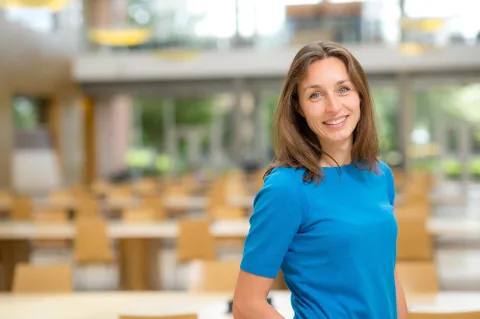“I see engineering as almost a Renaissance approach to science, where it doesn’t matter what discipline you’re in – you’re just using different knowledge and techniques to understand and solve the problem at hand.”
Dr. Carolina Tropini is using her expertise to engineer new microbes and tools to treat the chronic diseases, allergies and immune disorders that have resulted from our lifestyle changes over the past 100 years.

- Program:
- Campus: Vancouver
Website: Department Profile
Education: PhD in Biophysics (Stanford); BSc in Biophysics (UBC)
Tell us about your research.
My lab studies the microbes in our gut. As humans, we’re made up of almost as many cells that are of bacterial origin as we are cells that are human. We carry around this very complex ecosystem, and it’s an ecosystem that can change very rapidly. What might look like one year on earth time might just be a couple of hours for our microbiota.
Everything our microbiota produces makes its way into our blood system. So just as you take an aspirin by mouth to relieve a headache, everything the bacteria make in our gut can affect all organs. As humans, we’ve evolved with these bacteria so that they make the right compounds for us to develop properly and digest our food properly.
"The problem is that in the past 100 or so years, we’ve changed the way we interact with our environment – from eating processed food to overusing antibiotics – which has changed our microbiotic sphere. And this has led to diseases that our ancestors didn’t know about."
My research is trying to understand how to engineer our microbiota so it returns to its original state.
What projects are you working on in your lab?
On the engineering side, we’re making devices that sense which products are made by bacteria. We’re also looking at how we can let the bacteria tell us how the environment changes. Other more science-based projects we are studying what happens if you experience inflammation as a juvenile, including unexpected changes to developmental processes, and investigating the use of viruses instead of antibiotics to attack bacteria. And we have a project delving into basic biology to look at how you form a microbiota and whether we can integrate some of the ancient biomes we’ve lost through industrialization to get rid of inflammatory bacteria.
Your work must involve collaborations with researchers from many disciplines.
Yes, we collaborate both locally and internationally. That’s one of the things that’s really fun about science and engineering – you need to hear different voices.
"You can’t approach these big questions without having different perspectives – there’s real value in diversity and inclusion."
And it’s not just scientists and engineers. If we think about what we can do to change our diet to be more microbe friendly, we need to bring in people from other disciplines. Sociologists, psychologists and policymakers can provide guidance on how to communicate to the public the importance of eating vegetables, for example, so that the fibre in them can feed our microbiota and change the gut ecosystem for the better.
What courses do you teach?
I teach a number of courses, in biomedical engineering and microbiology. In biomedical engineering I’m teaching a course on how to miniaturize the lab for processes that use components that are very expensive or where most of the experiments need to happen at a very small scale.
Anything else you’d like to add?
Biomedical engineering is a very vibrant place to be. Here at UBC we have everything from people creating better helmets to prevent concussions to researchers developing new vaccines. It’s interdisciplinary and far-reaching.
"Each group has so much knowledge that they are keen to share, which I feel is quite unique to this place. It’s a fun and energetic environment, which is fantastic."







